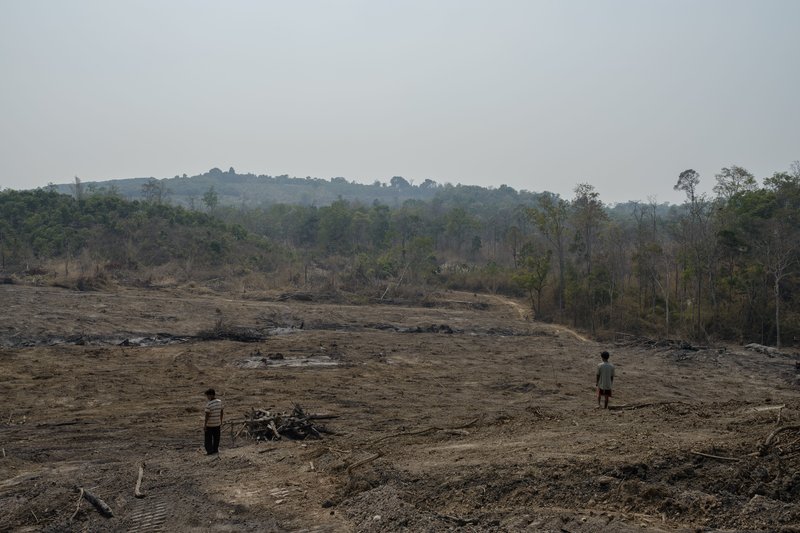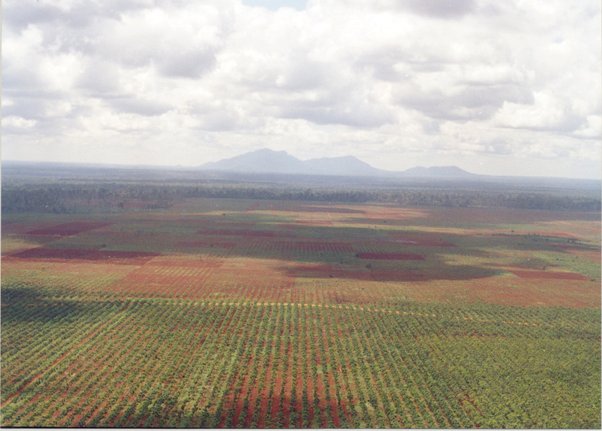When I first started working at Global Witness six years ago, nobody was talking about sustainable rubber or the harms caused by the industry

With 85% of the sector made up of smallholders, it was largely an unregulated industry and issues around deforestation and land-grabbing caused by large-scale expansion into new areas were poorly understood.
Our investigation in 2013 was the first to uncover the harms caused by the rubber industry – we exposed rubber companies in Cambodia and Laos carrying out forced land grabs without compensation, logging illegally in protected forests. Violence, harassment and forced evictions were regularly reported by local communities.
The exposé kick-started engagement with the rubber industry, but progress has been slow, particularly given the current context.
The world recently witnessed the fastest growing commercial pressure on land in history and the expansion of rubber plantations has been significant, accounting for over 6.3m hectares of recorded investments in the last fifteen years.
Around sixty per cent of natural rubber is used by the global tyre industry and this consumption has not come without consequences: as producer countries in South East Asia have run out of land for production, rubber producers have turned to several new ‘frontier’ markets such as Cambodia, Laos and Myanmar – countries with weak governance and rule of law, high levels of corruption and poor land rights – this time through large-scale expansion.
As vast tracts of agricultural land have been cleared to make way for large-scale rubber plantations, the costs are paid by poor rural communities and their surrounding forest ecosystems.
Three years after our investigation, in 2016, tyre giant Michelin was the first to adopt a sourcing policy on sustainable natural rubber which aimed to protect indigenous land rights, forests and biodiversity.
Over the next two years, the other major tyre companies followed suit with Bridgestone, Pirelli, Goodyear and Continental adopting similar sourcing policies.
These same companies are now part of a new global initiative: the Global Platform on Sustainable Natural Rubber (GPSNR). This was launched last week at the World Rubber Summit in Singapore.
It is the first global multi-stakeholder initiative aimed at addressing environmental and human rights abuses driven by the rubber industry. Platform members include major brand tyre companies and car manufacturers, rubber producers and processors and international NGOs.
The launch of the platform is generally a step in the right direction: the fact that it involves civil society as well as big business, and gives them an equal voice and voting rights is positive.
But it’s worth reflecting on what else has been happening globally over the last few years in terms of reducing harms in agribusiness supply chains and where the Global Platform on Sustainable Natural Rubber fits into that.
It’s no exaggeration to say that when it comes to attempts at reducing deforestation and protecting indigenous land rights, voluntary corporate commitments and self-regulated commodity schemes have predominantly failed.
Even the more credible certification schemes such as the Forest Stewardship Council (FSC) – which currently certifies a small number of rubber plantations – and the Roundtable on Sustainable Palm Oil (RSPO) have failed to root out core problems and, whilst certification can play a role, it’s insufficient on its own to prove legality or sustainability.
Weak certification schemes are in part why corporate ‘no deforestation’ commitments through the likes of the Consumer Goods Forum and the Tropical Forest Alliance 2020 are failing, and with 2020 being the target year that a large number of companies set themselves to meet these commitments, calls for mandatory regulation are likely to increase as these targets are missed.
Indeed some countries have already introduced such regulation: France introduced its ‘Duty of Vigilance’ Law – known informally as the Rana Plaza law – in 2017. It makes French companies more accountable for the actions in their supply chain by requiring them to present and implement a plan to address environmental and human rights risks throughout their supply chain operations, including overseas.
Michelin is now covered by this law – which includes its rubber supply chain - and civil society is already pushing for other countries to adopt equally progressive laws.
Companies in high risk commodities like rubber are also likely to come under increasing pressure from their investors. This month saw the European Parliament and Council reach a provisional political agreement on a new set of rules requiring European investors such as banks, pension funds and insurers, to carry out due diligence. Investors will need to disclose the steps they have taken to address the adverse impact of their investment decisions on people and planet.
Given that Global Witness’ investigation had previously highlighted how EU-based investors played a key role in funding rubber projects linked to land grabs and deforestation, this is a significant move towards greater investor and corporate accountability which may well impact on rubber and tyre companies.
So what does all this mean for the Global Platform on Sustainable Natural Rubber? Its mission is to promote sustainability across the rubber sector; improving livelihoods for smallholder farmers as well as addressing the harms caused by large-scale expansion.
Whilst this is a laudable mission, it is also one that has been developed by large corporations and international NGOs without the help of the small-scale farmers and local groups.
In order to be successful, the platform needs to involve indigenous farmers and communities as equal partners in the process.
In order to be successful, the platform needs to involve indigenous farmers and communities as equal partners in the process.
Favouring corporations and international NGOs is an easy trap that commodity mechanisms can fall into, as such groups have greater resources of time and money to stay involved during the long process. But the inclusion of indigenous communities – often the best stewards of the land and forests that they inhabit – is crucial.
Platform member companies can drive change by becoming more transparent – both about who they are buying from and how the different actors in their supply chain perform.
They should also drive sustainability through engagement and long-term relations with both suppliers, and governments, which includes clearly communicating sustainability objectives and helping them achieve these.
If suppliers have been involved in repeated violations of environmental standards or human rights, companies should put their money where their mouth is and stop buying commodities or services from them.
Ultimately, the kinds of abuses we have already seen caused by industrial rubber expansion need national legal reforms which vitally uphold indigenous peoples’ rights and protect ecosystems - often countries with weak rule of law and high levels of corruption do not provide this protection.
As such, the companies that source from these countries need to do more to ensure that the rubber in their tyres doesn’t cause harm. An inclusive sustainable rubber platform that is anticipating and working towards sectoral regulation could help raise standards across the whole of the sector and be the beginning of positive change for the rubber industry.
Ultimately we need to accept that voluntary schemes, however robust, can only achieve partial change. The platform should not be used as a box-ticking claim that its member companies are compliant in ‘sustainable rubber’.
Claims to “sustainability” not only risk greenwashing companies, but also omits what was arguably the ‘elephant in the room’ during years of discussions with the tyre companies, and that is the issue of long-term consumption patterns.
Ultimately, the only way to make production sustainable as a society is by controlling the level of demand to sustainable levels.
When the goal of any corporation is increasing profits based on continued growth, it would be inauthentic to label any commodity genuinely ‘sustainable’, something that all commodity schemes fail to address.

